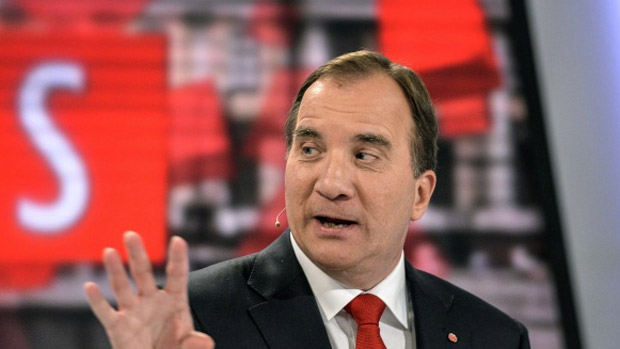Swedish elections: left back in power but far-right surges
Cameron loses a conservative ally as the far-right plans to take advantage of a weak minority government

A free daily email with the biggest news stories of the day – and the best features from TheWeek.com
You are now subscribed
Your newsletter sign-up was successful
The centre-left Social Democrats, one of Sweden's largest and oldest parties, won the biggest percentage of the vote in yesterday's election, but failed to secure a parliamentary majority.
As the country transitions from two years of conservative rule, Sweden now faces the prospect of a weak minority government in which the far-right Sweden Democrats could hold the balance of power.
The party received 12.9 per cent of the vote, more than double what it secured in the last election, to become Sweden's third largest party. The Spectator's Fraser Nelson described them as "the only real winners" in this year's election.
The Week
Escape your echo chamber. Get the facts behind the news, plus analysis from multiple perspectives.

Sign up for The Week's Free Newsletters
From our morning news briefing to a weekly Good News Newsletter, get the best of The Week delivered directly to your inbox.
From our morning news briefing to a weekly Good News Newsletter, get the best of The Week delivered directly to your inbox.
The party has gained support off the back of its vocal opposition to the country's liberal immigration policy. This year Sweden is expected to accept 80,000 asylum seekers from Syria and across the Middle East and Africa, a number the Sweden Democrats want to cut by 90 per cent.
The Social Democrat leader Stefan Lofven is expected to begin lengthy negotiations with the Green Party and the Left Party today, having made it clear that they will not work with the far-right group.
"You can't avoid taking us into account if you want to run the country," said Sweden Democrat leader Jimme Akesson, according to Reuters. "We are holding the absolute balance of power now."
"Cracks [have] start to show in the 'Nordic model'," writes the Guardian's Philip Olterman. Income gaps and unemployment are increasing while benefits are decreasing. The success of the far-right group has shown that "the main Swedish parties have failed," said Åsa Romson, leader of the Swedish Green Party.
A free daily email with the biggest news stories of the day – and the best features from TheWeek.com
Despite their refusal to work with the Sweden Democrats, some commentators argue that the centre-left bloc may be forced to strike a deal with members of the far right party in order to avoid political deadlock.
The effects of the election will also be felt in the rest of Europe. Prime Minister Fredrik Reinfeldt's departure was described by the Wall Street Journal as a "blow" to his fellow conservative leaders, David Cameron and Angela Merkel. Indeed, he said before stepping down: "It has been amazing to have been able to work with some of the most capable leaders that I think exist {...] Angela Merkel, David Cameron and Mark Rutte [the Dutch PM]."
The full results:
- Social Democrats 31.2%
- Moderate Party 23.2%
- Sweden Democrats 12.9%
- Green Party 6.8%
- Centre Party 6.1%
- Left Party 5.7%
- Liberal Party 5.4%
- Christian Democrats 4.6%
-
 The environmental cost of GLP-1s
The environmental cost of GLP-1sThe explainer Producing the drugs is a dirty process
-
 Greenland’s capital becomes ground zero for the country’s diplomatic straits
Greenland’s capital becomes ground zero for the country’s diplomatic straitsIN THE SPOTLIGHT A flurry of new consular activity in Nuuk shows how important Greenland has become to Europeans’ anxiety about American imperialism
-
 ‘This is something that happens all too often’
‘This is something that happens all too often’Instant Opinion Opinion, comment and editorials of the day
-
 Epstein files topple law CEO, roil UK government
Epstein files topple law CEO, roil UK governmentSpeed Read Peter Mandelson, Britain’s former ambassador to the US, is caught up in the scandal
-
 Iran and US prepare to meet after skirmishes
Iran and US prepare to meet after skirmishesSpeed Read The incident comes amid heightened tensions in the Middle East
-
 Israel retrieves final hostage’s body from Gaza
Israel retrieves final hostage’s body from GazaSpeed Read The 24-year-old police officer was killed during the initial Hamas attack
-
 China’s Xi targets top general in growing purge
China’s Xi targets top general in growing purgeSpeed Read Zhang Youxia is being investigated over ‘grave violations’ of the law
-
 Panama and Canada are negotiating over a crucial copper mine
Panama and Canada are negotiating over a crucial copper mineIn the Spotlight Panama is set to make a final decision on the mine this summer
-
 Why Greenland’s natural resources are nearly impossible to mine
Why Greenland’s natural resources are nearly impossible to mineThe Explainer The country’s natural landscape makes the task extremely difficult
-
 Iran cuts internet as protests escalate
Iran cuts internet as protests escalateSpeed Reada Government buildings across the country have been set on fire
-
 US nabs ‘shadow’ tanker claimed by Russia
US nabs ‘shadow’ tanker claimed by RussiaSpeed Read The ship was one of two vessels seized by the US military